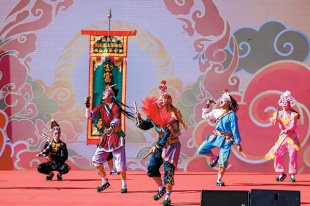Stitching together the strands of culture
Displays of ancient craftsmanship attract crowds at Beijing heritage showcase, Yang Feiyue reports.


As for the lunchbox, the butterfly patterns and feathers of the birds are carved and then painted, before the gold powder is carefully sprinkled to fill in the spaces. "The boxes shine when they catch the sunlight," Shi adds.
"We brought all the raw materials to the event, so the audience was able to get a better sense of our craft," Shi says, adding that she and her team want the audience to realize how the gold powder and mineral pigments are made. "Also, they last for centuries."
About 20 meters from Shi's stand, surprising shouts occasionally burst from the imperial carpet section, as Guo Lanhong demonstrated the value of a large carpet suspended in the air.
"The elastic yarn is made of cotton at the core, and covered with gold foil," Guo says.
An inch of the carpet is composed of more than 100 lines, each of which takes a proficient artist approximately 30 minutes to weave, she adds.
"It usually takes more than a year for a master to finish a large-sized carpet," Guo explains, saying that fine craftsmanship and labor intensity guarantee the carpet's high value, both artistically and financially.
"Historical anecdotes say ancient emperors would only use such a carpet when distinguished guests came, and would put it away once the reception was over," Guo says.





































